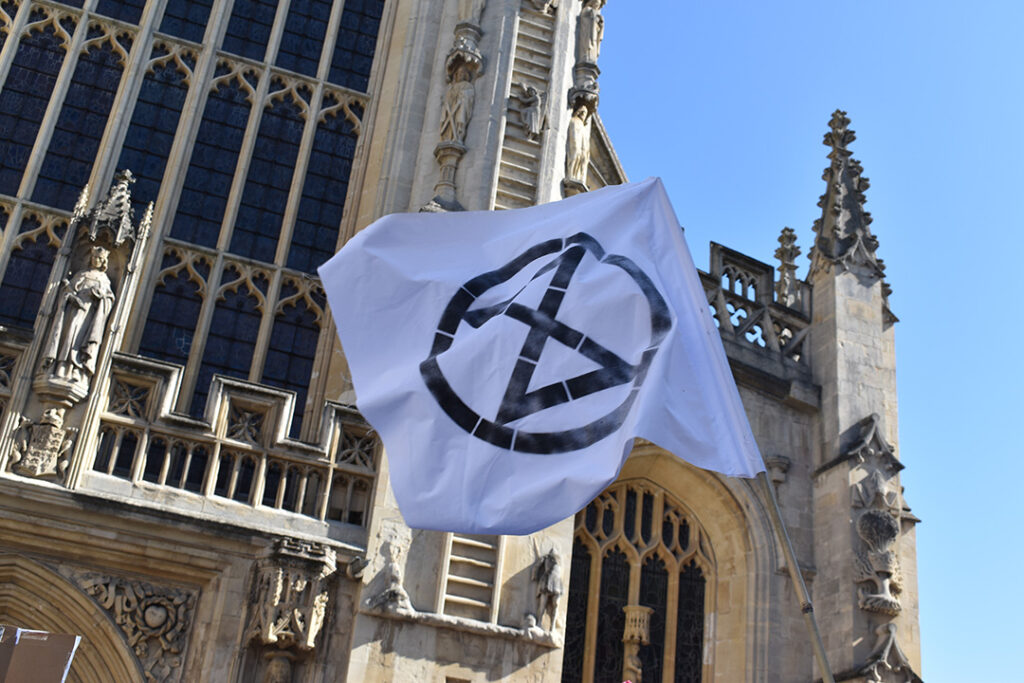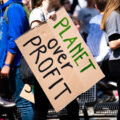Climate change, according to the world’s religions
Climate change, according to the world’s religions
Climate change is perhaps the biggest problem facing the world today. So how do the five largest religions view our warming planet?
Over 84% of the world’s population identifies with a religious group, with this set to increase to 87% by 2050.[1] [2] So it pays to know how different religions view various issues. This is all the more true when it comes to climate change, a global problem requiring a global solution.
When it comes to creating policy that mobilises the world’s population in the fight against climate change, religion is a factor that should not be ignored (as the UN Environment Program recognises).
Islam – “How will we face our Creator?”
In 2015, religious leaders and scholars from over 20 Muslim countries signed an ‘Islamic Declaration on Climate Change’. They call for wealthy, oil-rich countries to phase out their reliance on fossil fuels and support poorer countries to combat climate change.[3] Islam does not have a central figure of authority, like the pope for the Roman Catholic Church, so this show of unity is one of the strongest ways to express a ‘Muslim perspective’ on climate change.[4]
Their reasoning is faith-based: “What will future generations say of us, who leave them a degraded planet as our legacy?” the leaders ask. “How will we face our Lord and Creator?”[5]
The Quran contains around 200 verses concerning the environment, such as “greater indeed than the creation of man is the creation of the heavens and the earth.”[6] Muslims believe that humans should act as guardians, or khalifah, of the planet, and that they will be held accountable by God for their actions.
History shows that Muslim-led industries respond more favourably to environmental reasoning based on the Quran, than to facts and concepts perceived to come from Western powers.[7]
Judaism – the Garden of Eden
Jewish environmental movements draw inspiration from the story of the Garden of Eden (Genesis 2), where the Israelite God appointed humans as ‘stewards’ over creation. This stewardship entails responsibility for the wellbeing of the earth, according to most interpreters. It is possible to judge someone’s morality by the way they treat God’s creation. Some even say that human destruction of the environment represents a breach of their covenant with God.[8]
Some also point to Judaism’s strong advocation for justice for the poor and weak. They suggest Jews have a religious duty to combat climate change, which will disproportionately affect more impoverished countries.[9]
There are dozens of Jewish groups advocating for action on climate change, including The Jewish Climate Leadership Coalition founded earlier this year.[10] However, as with every religion, there is much diversity in how much attention different Jewish groups pay to climate change.[11] [12]
Christianity – justice and stewardship
Acknowledging the Hebrew Bible as Scripture, Christianity also subscribes to the same notions of justice and human stewardship of creation as Judaism.
Some scholars have argued that Christianity’s strong doctrine of an afterlife, as well as notions of human exceptionalism, lead to its incompatibility with environmentalism. Some also see the idea of the present world as ‘passing away’[13] as a reason not to care about the environment.[14] This is particularly noticeable among evangelical Christians,[15] some of whom see environmentalism as a threat to their faith and even “evil.”[16] However, there are signs these attitudes are changing.[17]
There are many strong reasons why Christians in particular should be concerned about our climate, such as Earth’s creation through and for Jesus (Colossians 1:16).[18]
Statements from all major Christian leaders,[19] including Pope Francis’s encyclical on ecology, Laudato Si’, demonstrate that concern for the earth’s climate is real within the religion.[20] The former archbishop of Canterbury, Rowan Williams, created a stir when he joined the controversial climate activist group Extinction Rebellion.[21]
Buddhism and the oneness of all creation
Scholars are divided as to whether the Buddhist faith itself entails a particular environmental ethic. Some believe Buddhists’ reluctance to harm even the smallest creature is due to the fear for their own spiritual wellbeing, rather than out of concern for nature.[22] Others counter that this reading is itself a Western misinterpretation of Buddhism. They point to resources within Buddhism that promote action in protecting the environment, such as Buddhist anthropology and the Four Noble Truths.[23] [24] [25]
Buddhists are more likely than average to believe that global warming is occurring, that it is caused by human activity, and that it is an important issue.[26]
Since his retirement from politics and leadership of the Free Tibet movement, the Dalai Lama has devoted himself to the fight against climate change. Seen by many as Buddhism’s spiritual leader, the Dalai Lama has urged world leaders and the UN to invest more in slowing climate change, even saying that “Buddha would be green.”[27]
His motivation to support this cause? The essential oneness of all human beings, regardless of nation, race, or creed. Climate change is a problem that will affect us all, and a problem that needs to be fought with compassion. At least for the Dalai Lama, his Buddhist faith clearly drives his concern for the climate.[28]
Hinduism – nature as an extension of the divine
Hinduism is an extremely diverse religious tradition, with no single defining text or leader. However, in 2009, Hindu leaders gathered together to sign the Hindu Declaration on Climate Change. This document acknowledges climate change as a serious problem, and points to religious reasons why Hindus have a duty to protect the environment.[29]
Caring for the environment has been argued to be an expression of dharma, a foundational principle in Hinduism, that governs all reality and guides how all things should be.[30] The idea of karma, in which one’s actions have direct consequences in future forms of existence, can also have an environmental dimension: if one destroys the planet, one’s future lives will not only be poorer, but they will also be lived in a polluted environment.[31]
Many Hindu texts praise nature’s sacred phenomena and counsel human care of the environment. Some aspects of nature are even considered to be extensions of the divine.[32]
Faith in our planet?
Religion clearly has a lot to say about climate change. Within each religion there is a spectrum of attitudes towards the climate crisis, all of which are influenced by other factors (economic, ideological, political) to some extent. It is impossible to identify the definitive Buddhist perspective on climate change, as with any issue.
However, today’s major religions generally view the earth as made by God and therefore precious. There are also growing movements within religions to demonstrate this belief more visibly on the issue of climate change.
Climate change has also proved to be an issue around which different faiths can unite, for example in the Interfaith Centre for Sustainable Development.
Environmentalism has been called a ‘new religion’, giving atheists the community, beliefs, and a clear sense of purpose that accompanies traditional religions.[33] But as we have seen, all major religions contain strong arguments for fighting climate change on religious bases. Governments and climate change lobbyists would be wise to harness this energy.
Want to learn more about similar topics? Go to the EARS Dashboard
Sources
[1] Religion: why faith is becoming more and more popular
[2] How Religion Influences Our Relationship With the Environment
[3] Islamic leaders issue bold call for rapid phase out of fossil fuels
[4] Islamic leaders issue bold call for rapid phase out of fossil fuels
[5] Islamic Declaration on Climate Change
[6] What does Islam say about climate change and climate action? (Surah Ghafir 40:57)
[7] What does Islam say about climate change and climate action?
[8] Judaism and Climate Change
[9] Jewish Values on Climate Change & Energy
[10] Jewish Climate Leadership Coalition
[11] Judaism and Climate Change
[12] Why is Judaism irrelevant to climate change?
[13] E.g. 1 John 2:17; Matthew 24:35; 1 Corinthians 7:31.
[14] The US evangelicals who believe environmentalism is a ‘native evil’
[15] Smith N, Leiserowitz A (2013) “American evangelicals and global warming.” Glob Environ Chang 23: 1009–1017.
[16] Understanding Christians’ climate views can lead to better conversations about the environment
[17] Bible demands action on climate change, Evangelicals say in new report
[18] Why Christians should care about climate change
[19] World’s top three Christian leaders in climate appeal ahead of U.N. summit
[20] Pope Francis Encyclical and Climate Change
[21] Rowan Williams and bishops join Extinction Rebellion as Christians arrested
[22] Harris, Ian. “How environmentalist is Buddhism?.” Religion 21.2 (1991): 101-114.
[23] Resources for Buddhist environmental ethics
[24] The Buddha’s Path Of Freedom And Climate Change Mitigation
[25] Buddhist Faith Statement on the Environment
[26] Religion Does Matter for Climate Change Attitudes and Behavior
[27] ‘Buddha would be green’: Dalai Lama calls for urgent climate action
[28] ‘Buddha would be green’: Dalai Lama calls for urgent climate action
[29] Hindu Declaration on Climate Change
[30] Robin Rinehart, “Introduction: The Historical Background,” in Robin Rinehart, ed., Contemporary Hinduism: Ritual, culture, and practice (California: ABC-CLIO, 2004), pp. 1-66.
[31] Can Religion Teach Us to Protect Our Environment? Analyzing the Case of Hinduism
[32] O. P. Dwivedi, “Hindu Religion and Environmental Well-Being,” in Roger S. Gottlieb, ed., The Oxford Handbook of Religion and Ecology (Oxford: Oxford University Press, 2009).






